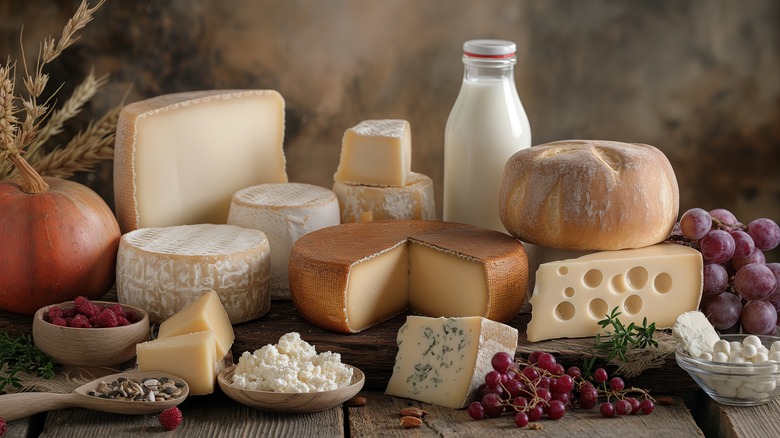The Science Behind Why Cheese Sweats Happen
Cheese is fantastic. So fantastic that 14.1 billion pounds of cheese were produced over the course of 2023 in the U.S alone. Every rose has its thorns, however, and while many enjoy snacking on cheese, some also experience the cheese sweats. It all comes down to the endless wonder that is the human body and how our digestive system breaks down the milk product.
The cheese sweats, clinically known as gustatory sweating, are triggered by the proteins and amino acids in dairy based cheeses. Tyramine and casein are two of the main components in cheese. As the body digests cheese (and other foods high in tyramine like cured meats) it causes a chain reaction. The enzymes released tell your body to release norepinephrine, adrenaline's cohort. This chemical in turn pumps through the blood stream and causes you to feel flushed, have an elevated heart rate, sweat, and in severe cases, vomit. Now, everyone is different. The severity and threshold for the cheese sweats will vary body to body. In very rare instances, gustatory sweating is linked to diabetes, but not in a causative way. Surprisingly, being lactose intolerant does not have any bearing on the severity of cheese sweats one could experience. In fact, cheeses highest in tyramine have the lowest levels of lactose.
Need for cheese
If the cheese sweats aren't enough for you to change out your snack or avoid trendy charcuterie boards, it's due to casein. As casein moves through the digestive tract, it signals the brain to release dopamine. Dopamine is basically the brain's happy chemical. When we do an activity we love, exercise, lay out in the sun, or eat something we enjoy, our brain releases dopamine. Via the casein in cheese, the release of dopamine can be so strong that it mimics the effects of sugar and even cocaine on an MRI. Cheese is not inherently addictive though; to reach that threshold you'd have to consume an insane amount of cheese that is enormously high in casein. But it is enough to keep us coming back for more, despite the dewy brow. Like tyramine, the harder the cheese the higher the content of casein.
The amount of tyramine and casein consolidate within the cheese during the aging process. The length of the aging process and the moisture content of the cheese are what delineate a cheese as hard or soft. Soft cheeses like Brie, mascarpone, and burrata will have less of these compounds, whereas parmesan, cheddar, or Camembert are hard cheeses and therefore have more. Because of how the body may react, people who take certain anti-depressants should avoid hard cheeses. If you're vegan, double check the label — some soy-based nondairy cheeses will still contain low amounts of casein as the milk-based ingredient is used in production to improve meltability.


